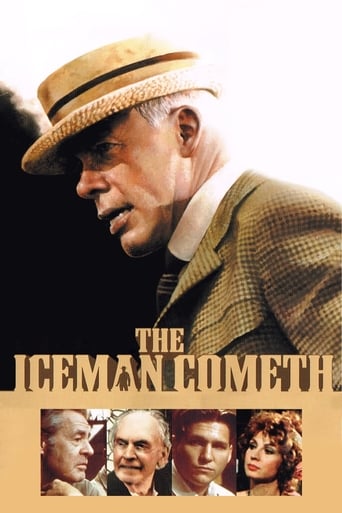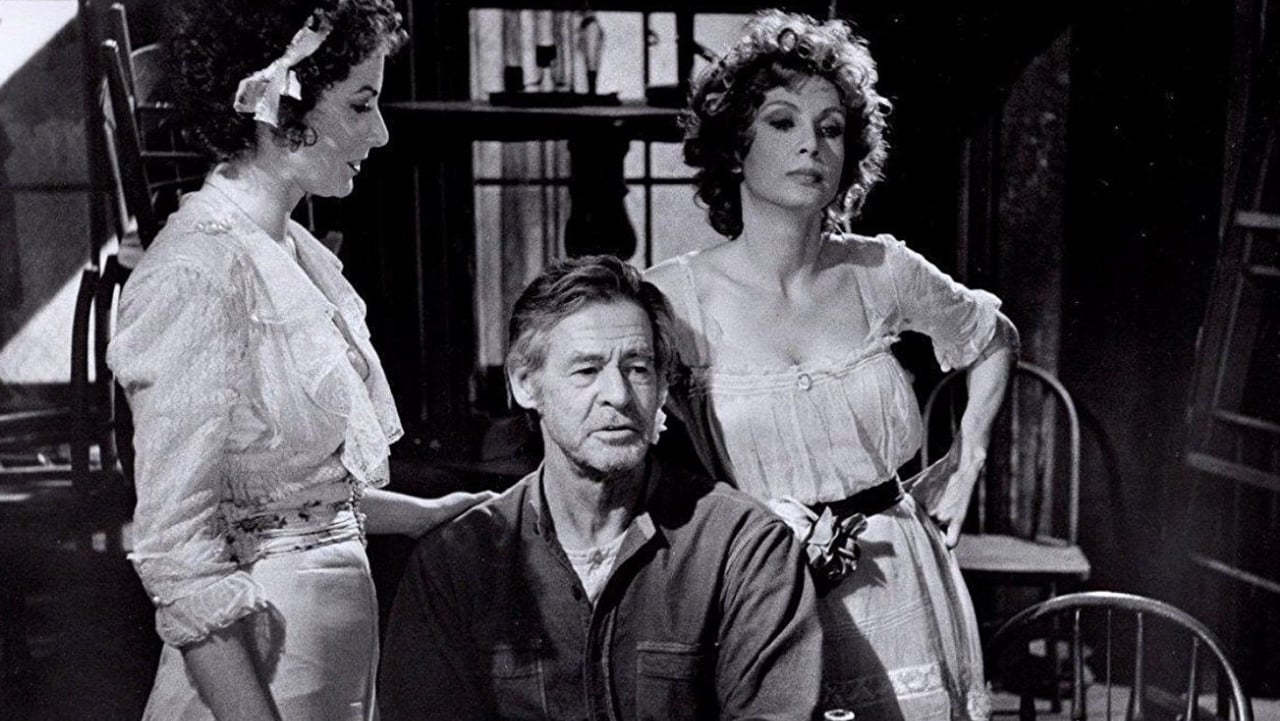sissoed
Never having see "Iceman" live or on film, I watched the 1973 Lee Marvin version first, then the 1960 Jason Robards version, because I wanted to see the Lee Marvin approach without the bias of having previously seen the famous Robards approach. Both performances were excellent: Marvin was more believable as a coarse, cheating salesman, while Robards was more soft and humane. Each connected deeply into the playwright's vision, but differently. The major difference between the two productions is not Hickey, but his main foil, Larry Slade. In the 1973 version, Ryan opens the play with hopeless bitterness, a darkness that suffuses the first scene. In the 1960 version, McCormick begins the part with a lighter, bemused detachment. In the 1960 version, Slade is reading newspapers, which shows he still has an interest in the world. In the 1973 version, Ryan's Slade is in gloom, no newspapers in sight and no light to read them by even if he had them. In fact, the first scene of the 1973 version is so slow and gloomy that it is very hard to see any reason to watch the play. None of the characters makes you want to spend a little more time with them, and none of them interact with each other in a way that is friendly or kind. The 1960 version is much lighter, and the emotional ties between sub-groups of characters are more developed. The 1973 version comes to life only when Hickey enters (the 1960 version is alive from the start), and Marvin's Hickey redeems the tedium of the scenes that precede him. Also, in the 1973 version of the 1st scene, when one character is speaking to another, the camera is often behind and to the side of the head of the listener, showing only the back and side of the listener's head. This prevents us from seeing the listener reacting to the speaker, which turns all these speeches into soliloquies delivered into the air. Now, I don't know which version is closer to O'Neill's vision (although we can be pretty sure the 1960 version is closer to O'Neill's text), but I can say that in the 1973 version, up until Marvin's Hickey arrives, it's hard to feel any desire to listen to any of these self-involved, isolated, moody failures. In the 1960 version you get a sense that this is a community of people with some positive aspects a web of friendships, or at least, the appearance of friendships. A problem common to both versions is the implausibility of a room full of these sleeping or lethargic people slumped over the tables, allegedly because they were all waiting for Hickey. A reviewer pointed out that the play reworks the 'Last Supper,' with Hickey in the Christ role, and the other men regulars in the role of the 12 disciples. However, there are 13 male characters in addition to Hickey, so it appears that O'Neill has changed the structure. As regards the 'Last Supper' model, the Christ character is not Hickey, but Larry Slade. He is the one whom Parritt comes to Parritt, who betrayed the movement and his mother for money, and who thus functions in a Judas role, and who seeks Slade's forgiveness. But the Christ here Slade is a 'savior' who knows nothing, who has lost faith in his own movement. Hickey is the new character, one who was not at the 'Last Supper.' Hickey's repeated protestations of wanting to help the others, and the way in which he can help them, shows that Hickey is not a Christ, but a kind of Buddhist bodhisattva to quote one definition, a being 'who delays his own final and complete enlightenment in order to save all sentient beings out of his enormous compassion
on a mission to liberate all sentient beings, and only then will he rest and complete his own enlightenment.' In 1939, when O'Neill wrote "Iceman," he was deeply interested in Eastern religions, and in fact wrote "Iceman" while living in a home he gave an Eastern name, "Tao House," meaning 'the right way of life.' At the table where the characters are all gathered for Harry Hope's birthday party, Hickey talks about how his goal is to get all of the inmates of Hope's bar feeling "you won't give a damn what you are anymore" and "don't give a damn about anything anymore" this is the indifference, the non-feelingness, of the eastern concept of nirvana. Immediately after this, Slade responds by characterizing the people in the saloon as "us poor pipe-dreaming sinners along the sawdust trail of salvation" the imagery of Christian salvation. This sets up the fundamental issue of the play: whether Buddhist concepts of nirvana can replace the failed (at least, failed to O'Neill) salvation concepts of Christianity. By the end of the play, we know O'Neill's answer: no. Hickey learns first that although he has forced the others to face up to the failed people they really are, this has not brought them peace; and then, almost as an accident, Hickey himself learns that his own peace has been based on a flattering lie to himself about himself. Once he sees his own reality, the reality of how fallen he really is, not even he, the bodhisattva, can face it. Seeing how the others are clinging to happiness by feeling hope that they are better than they really are, he decides to fall-in with their self-lying, so that they will also lie and tell him that they agree that he is a better person than he really is. Only Slade, the Christ-figure, says that Hickey has converted him to be able to face his worthlessness and self-deception. At this point, Parritt following the Judas model, Judas who hung himself out of guilt kills himself by leaping from a height.
danielj_old999
It seems that there have been a few actors psychologically and kinesthetically "born" to interpret the works of a certain great playwright (or director) as Toshiro Mifune/Akira Kurosawa for the cinema. It would seem that March and Jason Robards had this relationship with Eugene O'Neill. I've been told that March's performance in "Long Day's Journey into Night" in NYC in the 1950's was for the ages; this "ICEMAN" is another example. I had always thought that in his high gloss Hollywood films March appeared a bit flat and dull (excepting of course "Dr. Jekyll and Mr. Hyde"). In this film we can see a great actor regalvanized in one of the greatest supporting performances ever committed to film. Beneath the sheer coating of mordant humor which March provides with such finesse, we witness the total, volcanic deterioration and spiritual anguish of a human being. Probably the two greatest career finishes in cinema history were March and Robert Ryan in this movie.
wem
This is more of a question than a comment. I recently taped the 1973 film version of THE ICEMAN COMETH from the Encore cable film channel. The movie, which is excellent and highly recommended (though seeing a production of the play is even more effective), was vastly shorter (by an entire hour!) than I had remembered it being when I saw it twice back in the 70's and 80's. I am almost certain that this three hour version aired by Encore is something doctored up by the studio to offer a more palatable running time to cable channels and art houses.My question is: does anyone know if the four hour version still exists; and if there is anyway of getting my hands on it? The many, MANY, internal cuts in the three hour version (probably unnoticeable if you're not familiar with the play or the longer version of the movie) seriously undercuts the power of O'Neill's great play.
Denis Forster
I am adding my comment because the TV version did not show up on the IMDB cross-reference list. This play was previously produced in the early 1960s for the TV "Play of the Week" series. It starred Jason Robards Jr. as Hickey. Many consider this his finest performance and this TV version, the finest production. I saw both the movie version listed here and the TV version. As good as Lee Marvin's performance was, I also agree that the TV version is superior. See this if you can. The Iceman Cometh also happens to be my favorite play.An aside; I believe that Jason Robards Jr. was not offered the part for the movie version because at that time, his alcoholism got the better of him. There is irony here since the play demonstrates the impact of alcoholism and the pipe dreams that come from it. Up till then, the role of Hickey belonged to Mr. Robards Jr. as it should have. Mr. Robards Jr. interpretation of Eugene O'Neill's plays have always been masterful. I am convinced he was deeply hurt and has always regretted not being able to perform in the movie production.An experiment that I am sorry ended.This movie was an early part of a new production experiment in which the audience prepaid for the series (I am not sure of the series name but I seem to remember the American Film Theater or Institute). I had subscribed to it and I am sorry that the experiment failed after producing perhaps no more than 10 fine productions of classic plays.



 AD
AD


